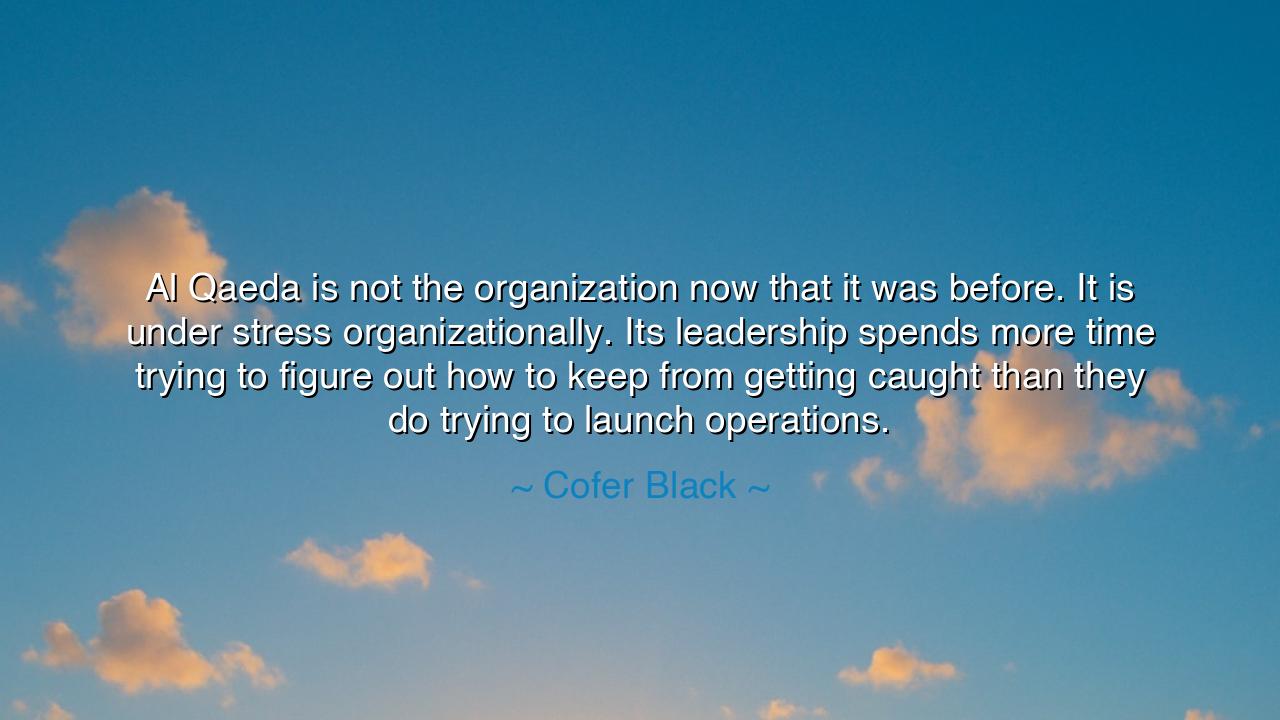
Al Qaeda is not the organization now that it was before. It is
Al Qaeda is not the organization now that it was before. It is under stress organizationally. Its leadership spends more time trying to figure out how to keep from getting caught than they do trying to launch operations.






When Cofer Black declared, “Al Qaeda is not the organization now that it was before. It is under stress organizationally. Its leadership spends more time trying to figure out how to keep from getting caught than they do trying to launch operations,” he was not merely describing a state of warfare — he was revealing a timeless truth about power, fear, and the decay of evil under pressure. Beneath his words lies the wisdom of one who has watched from the shadows, who has seen that even the mightiest of foes, when hunted relentlessly and stripped of safety, turn inward, consumed not by ambition but by self-preservation. It is a reflection on how strength fades when vigilance closes in, and how the forces of destruction, once confident and commanding, can crumble beneath the weight of their own fear.
The origin of this quote comes from Black’s tenure as a leading figure in American intelligence — a man who devoted his life to combating terrorism in the wake of the September 11th attacks. As the former head of the CIA’s Counterterrorist Center, Cofer Black stood at the crossroads of danger and strategy. His words were not born from theory, but from observation in the crucible of conflict. He spoke them during a time when the world was awakening to a new kind of enemy — one that moved through shadows, struck without warning, and claimed allegiance to no nation. His statement was not triumphalism, but a solemn recognition that the relentless pursuit of justice can turn even the most fearsome adversary into prey.
Yet beyond its political and military meaning, Black’s insight carries a broader, ancient wisdom: that fear corrodes purpose. Every organization, every person who acts through deceit, cruelty, or domination, eventually finds themselves ensnared by the consequences of their own actions. Like a serpent coiled upon itself, they become trapped by the very cunning that once made them strong. In warfare, as in life, those who live by treachery must forever watch their backs, for the sword they wield against others becomes the sword that haunts them. In this sense, Black’s observation transcends Al Qaeda — it speaks of the inevitable decline of all who build their power upon fear and destruction.
History offers many mirrors of this truth. In the fall of Nazi Germany, when the Allies closed in from all sides, the once-mighty regime turned inward. Paranoia consumed its ranks, loyalty fractured, and leaders spent their final days in underground bunkers — not plotting victory, but hiding from judgment. The empire that had sought to dominate the world ended not with conquest, but with suicide and ruin. So too did Al Qaeda, once bold and ruthless, become fragmented and hunted. Their leaders, once masters of terror, became fugitives, their days spent not in grand planning, but in desperate evasion. Such is the fate of all who wield power without wisdom — they are devoured by their own darkness.
In the style of the ancients, one might say that Black’s words remind us of Nemesis, the goddess who punished hubris — that overreaching pride which blinds men to their own mortality. Al Qaeda, like many before it, mistook cruelty for strength, vengeance for justice, and fanaticism for faith. But Nemesis always comes. She moves silently, as time and consequence do, until the tyrant who once seemed invincible must cower in the very shadows he once commanded. Thus, Black’s statement is not only intelligence analysis; it is moral prophecy — that those who serve destruction will, in the end, be destroyed by it.
There is a practical wisdom here for all who lead, whether in war, in business, or in life: power without virtue consumes itself. The moment one spends more energy defending one’s wrongs than pursuing one’s purpose, decline has begun. Just as Al Qaeda’s leaders became trapped in fear of capture, so too does every soul that lives in deceit become imprisoned by the lies it must maintain. The same law governs the battlefield and the heart: strength endures only when it serves truth.
And so, let the lesson of Cofer Black’s words echo across generations: that evil, though fierce in its season, cannot outlast the vigilance of the just. The forces of chaos, when pressed by the light of accountability, always turn upon themselves. This is not merely the triumph of nations — it is the law of the universe, written in the moral fabric of existence. As the ancients would say, “The wicked flee when none pursueth, but the righteous are bold as a lion.” In that eternal balance, we find the same truth that Black spoke of: that darkness, once cornered, collapses under its own fear — and light, though slow in its coming, always prevails.






AAdministratorAdministrator
Welcome, honored guests. Please leave a comment, we will respond soon